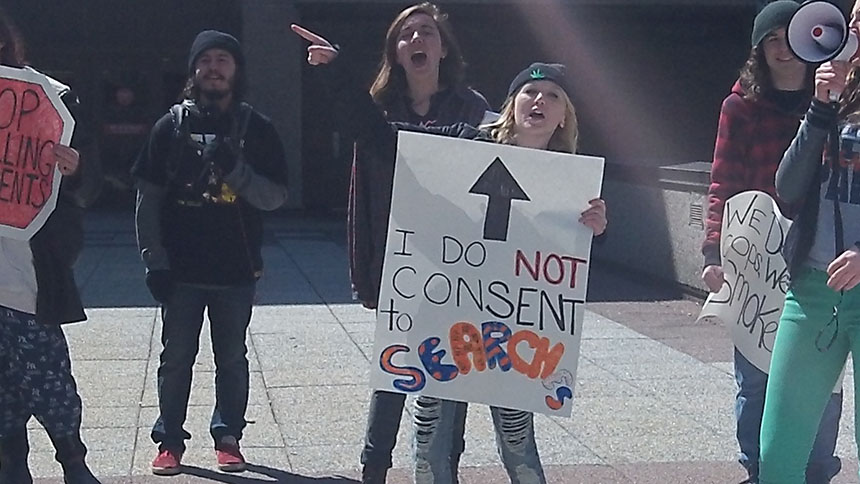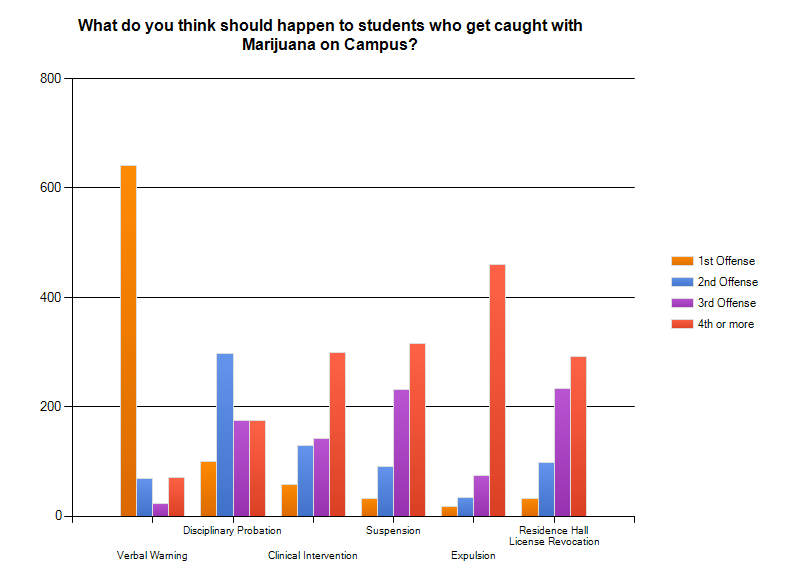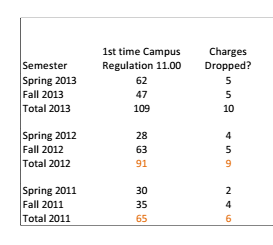
What is higher, the SUNY New Paltz students or marijuana penalty rates?
SUNY New Paltz’s administration won’t budge with their “No Second Chance” marijuana policy and disregards students’ efforts to make its penalties more lenient. The drug policy is one of the most specific and strict in the State University of New York (SUNY) system.
SUNY New Paltz’s 2013-2014 student handbook states that a first marijuana offense will result in “not less than Disciplinary Probation and educational and/or clinical intervention and parental notification if applicable, not more than Expulsion,” and that a second offense will result in “not less than Expulsion.”
EDITOR’S NOTE: See update
However, many students object to this policy and believe that smoking marijuana should not hinder anyone’s chances to stay in college.
“Let’s fix this policy. The education of students who smoke weed isn’t any less important than your non-smoker,” said Kelly Brennan, president of Students for Sensible Drug Policy (SSDP).
Currently there is an online petition with 1,035 supporters asking SUNY New Paltz’s president, Donald P. Christian, that the policy be improved and mirror New York State’s policy for underage alcohol possession.
Student determination did not stop there. In Nov. 2013, a campus-wide survey created by the Student Association (SA) showed that the majority of students polled voted in favor of a verbal warning as the first offense. The majority of students also voted for expulsion as a “fourth or more” offense.
Nevertheless, Raymond Schwarz, vice president of student affairs, strongly believes giving students more chances will lead to an increase of drugs on campus.
The Department of Student Affairs is in charge of enforcing marijuana regulations. According to their statistics, since 2011, first time offenders have increased on New Paltz’s college campus, ranging from 65 charges in 2011, 91 in 2012, and 109 in 2013.
 While other SUNY schools have the freedom to create sanctions that they feel are best for their community, SSDP members and other student advocates argue that other SUNY schools have more effective policies.
While other SUNY schools have the freedom to create sanctions that they feel are best for their community, SSDP members and other student advocates argue that other SUNY schools have more effective policies.
According to student handbooks and policy enforcers of other SUNY schools, whose populations resemble SUNY New Paltz’s, marijuana incidents had no hard and fast rules and were approached on a “case-by-case” basis. Below are descriptions of the actions these SUNY schools typically take when penalizing their students:
SUNY Geneseo: Prior sanctions and students’ attitudes towards self-growth are taken into consideration.
- First Offense: Disciplinary probation is applied. Probation can be for one semester or one academic year. Student must meet an educational requirement and speak with an Alcohol and Other Drugs (AOD) coordinator for two sessions.
- Second Offense: Student must meet with an evaluator. Thereafter, student conduct board decides what the following sanction will be.
SUNY Oswego: Sanctions are based on context such as the amount of marijuana student was in possession of, how frequently they smoke, and their reasoning behind their use. Standards are flexible based on student needs.
- First Offense: Student must meet an educational requirement and with an AOD coordinator.
- Second Offense: Two meetings with an AOD coordinator and educational requirement.
- Third Offense: Student will most likely face suspension.
SUNY Cortland: Students’ past records are taken into consideration.
- First Offense: Disciplinary probation for one calender year. Additionally, the student will meet with an AOD coordinator, complete a substance education program with an educational program that charges a 30 dollar fee. The student will also have to complete 30 hours of community service. This is the minimum sanction.
- Second Offense: The student is likely to face one semester of suspension in addition to meeting with a counselor at their own expense and completing any recommended treatment.
- Third Offense: The student will most likely face additional suspensions for each violation.
For these SUNY colleges, expulsion had not been sanctioned for students who used the drug recreationally for years.
By contrast, in the past three years, 10 SUNY New Paltz students were charged with a second offense resulting in expulsion. Out of these 10, eight withdrew, one didn’t return, and one was officially expelled.
“Any zero tolerance where you’re not going to look at a situation case-by-case or based on context is inevitably flawed. [SUNY New Paltz] is trying to push this system on all these different situations and act like every student getting kicked out is the same,” said Harry Russell, a 21-year-old sophomore who had a 3.92 grade point average before he was caught for a second time at SUNY New Paltz, and withdrew in the fall of 2013.
The policy was originally more “punitive” before 1997 when the policy was reformed. Expulsion had once been the only consequence offered at the institution.
Even though police logs show that marijuana continues to be the most prevalent drug used at SUNY campuses, according to these other SUNY colleges’ annual security and safety reports, drug violations rates vary and have not been consistently decreasing nor increasing. This makes it impossible to draw any correlations between the institution’s policies and students drug use.
Still, SUNY New Paltz’s administrators are convinced that their policy works best. Not phased by other school’s policies, student rallies or demonstrations, the staunch policy enforcers are not considering any changes and are focused on moving SUNY New Paltz “forward,” towards a reputation that represents serious academics.
“If all the students said we want this policy to change and I truly believed that doing so would encourage more drugs, I’d still say no. I wouldn’t be able to live with myself,” Schwarz said.
